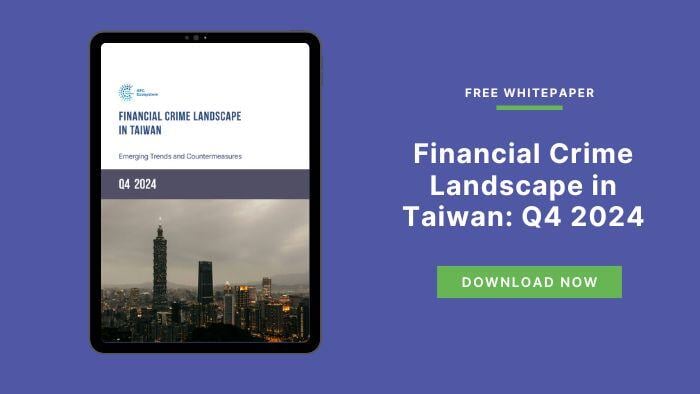Understanding the Importance of AML and Compliance in Taiwan
As financial crime continues to grow in complexity, countries around the world are intensifying their efforts to implement robust regulatory frameworks. One such example is Taiwan—a rapidly advancing economy that plays a crucial role in global finance. In this context, AML and compliance initiatives have taken center stage as key pillars in the fight against money laundering, terrorist financing, and other illicit financial activities.
In this blog, we’ll explore why AML compliance is more important than ever in Taiwan, what the current regulatory landscape looks like, and how financial institutions can leverage technology to stay ahead of threats.
What is AML and Compliance?
AML (Anti-Money Laundering) and compliance refer to the frameworks, processes, and regulations that financial institutions and businesses implement to detect, prevent, and report suspicious activities. These activities may include money laundering, terrorist financing, fraud, and other financial crimes.
In Taiwan, AML and compliance are not just regulatory requirements—they are strategic imperatives that help protect financial institutions from reputational damage, regulatory penalties, and systemic risks.
Taiwan’s AML Regulatory Landscape
Taiwan has made significant strides in strengthening its AML regime. The country’s efforts are led by three main regulatory bodies:
-
Financial Supervisory Commission (FSC) – Oversees financial institutions and enforces AML compliance across banks, securities firms, insurance companies, and fintech providers.
-
Central Bank of the Republic of China (Taiwan) – Supervises monetary policy, including payment and settlement systems.
-
Investigation Bureau of the Ministry of Justice – Conducts criminal investigations related to money laundering and other financial crimes.
These agencies coordinate to enforce Taiwan’s Money Laundering Control Act (MLCA), the Counter-Terrorism Financing Act (CTFA), and relevant international guidelines set by the Financial Action Task Force (FATF).
Penalties for Non-Compliance
Financial institutions in Taiwan face severe consequences for failing to comply with AML regulations, including:
-
Hefty fines imposed by the FSC
-
Suspension or revocation of operating licenses
-
Criminal prosecution for individuals or corporate officers
-
Damage to brand reputation and loss of public trust
With Taiwan’s increasing emphasis on aligning with FATF recommendations, regulators are becoming more vigilant—and enforcement more stringent.
Common AML Compliance Risks in Taiwan
Failure to meet AML and compliance standards can lead to significant institutional, financial, and reputational damage. In Taiwan, common risks include:
-
Money Mule Activity – Dormant and personal accounts used unknowingly to move illicit funds.
-
Account Takeover (ATO) Fraud – Cybercriminals use phishing and credential theft to access user accounts and move money.
-
Trade-Based Money Laundering (TBML) – Exploiting trade flows to disguise illicit funds.
-
Investment and Romance Scams – Criminals targeting individuals to extract and launder money.
-
Shell Companies and Beneficial Ownership Gaps – Misuse of legal persons to conceal the origin and flow of funds.
Establishing a Strong AML Compliance Framework
A strong AML compliance program in Taiwan includes the following key elements:
1. Risk Assessment and Governance
Firms must regularly assess their exposure to money laundering risks. This involves understanding customer types, geographies, transaction patterns, and delivery channels.
2. AML Policies and Internal Controls
Institutions should draft policies in line with FSC and FATF recommendations. These include customer due diligence (CDD), enhanced due diligence (EDD) for high-risk clients, and reporting suspicious transactions (STRs).
3. Employee Training
AML and compliance are only as effective as the people enforcing them. Employees must receive continuous training on red flags, typologies, and reporting protocols.
4. Independent Review and Audit
Internal audits help validate the effectiveness of AML controls and ensure that policies are consistently applied across business lines.
Role of Technology in AML and Compliance
As financial crimes become more sophisticated, traditional rule-based systems often fall short. Manual alert reviews, static risk scores, and delayed reporting are no longer sufficient.
Modern AML compliance requires:
-
Real-time transaction monitoring
-
Behavioral analytics and pattern recognition
-
Advanced customer risk profiling
-
Automated name screening across multiple sanctions and PEP lists
-
Integrated case management and audit trails
This is where advanced AML software solutions like Tookitaki’s FinCense come into play.
How Tookitaki Helps Taiwanese Financial Institutions
Tookitaki offers an end-to-end AML and compliance platform that empowers financial institutions to meet regulatory expectations and respond faster to emerging risks.
✅ AI-Powered Transaction Monitoring
Tookitaki’s Transaction Monitoring module uses machine learning to detect anomalous behavior. Its powerful simulation mode allows AML teams to test and deploy new typologies in minutes—onboarding scenarios 50% faster than traditional systems.
✅ Smart Name Screening
The Smart Screening module combines 50+ fuzzy matching techniques, multilingual support, and cross-lingual transliteration to deliver accurate, real-time results with reduced false positives.
✅ Customer Risk Scoring
An adaptive module that builds a dynamic 360-degree risk profile using behavioural signals. It improves onboarding, helps detect hidden risks, and optimises compliance strategies.
✅ Collaborative Case Management
Tookitaki’s Case Manager streamlines case allocation, automates evidence collection, and enables secure collaboration across teams.
✅ The AFC Ecosystem Advantage
In addition to FinCense, Tookitaki offers the Anti-Financial Crime (AFC) Ecosystem—a first-of-its-kind platform where compliance professionals contribute real-world typologies. This community-driven model gives Tookitaki customers access to global risk scenarios, helping them adapt quickly to local and cross-border threats.
Key Benefits for Taiwanese Institutions
Tookitaki’s AML and compliance solutions help financial institutions in Taiwan to:
-
Stay ahead of fast-evolving financial crime typologies
-
Reduce false positives and investigation time
-
Automate scenario deployment and threshold tuning
-
Improve overall operational efficiency
-
Ensure alignment with FSC and FATF expectations
Whether you're a digital bank, remittance provider, or traditional institution, Tookitaki helps future-proof your compliance infrastructure.
Real-World Impact: Faster Detection, Lower Costs
By implementing Tookitaki’s FinCense, leading financial institutions have achieved:
-
50% faster onboarding of AML scenarios
-
Over 40% reduction in false positives
-
Improved detection of mule networks and cross-border laundering
-
Scalable compliance across new products and geographies
These outcomes translate to direct savings in compliance costs and better protection against reputational damage.
Final Thoughts: Future of AML and Compliance in Taiwan
Taiwan continues to tighten its AML and compliance regime amid global scrutiny. However, financial criminals remain agile, adapting quickly to regulatory loopholes and technology gaps.
To stay ahead, financial institutions must go beyond checkbox compliance and embrace intelligent, collaborative, and adaptive frameworks. With advanced tools like Tookitaki’s FinCense and the AFC Ecosystem, they can transform AML from a burden into a strategic advantage.
Anti-Financial Crime Compliance with Tookitaki?






